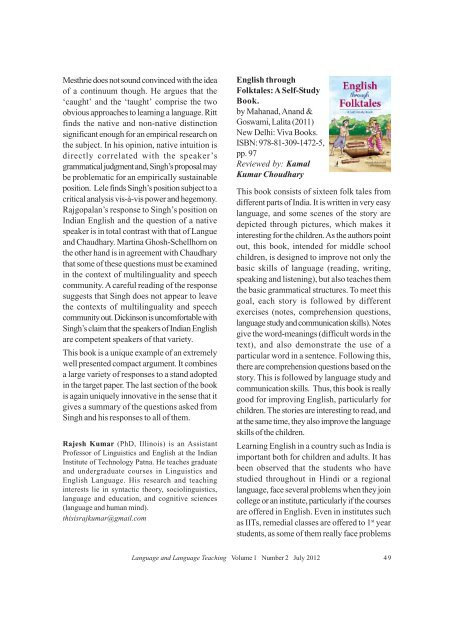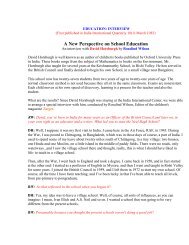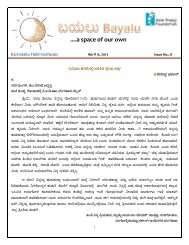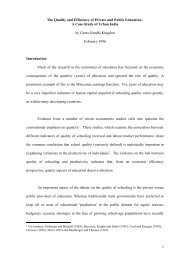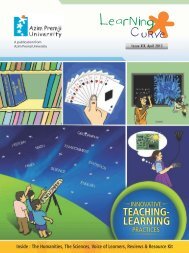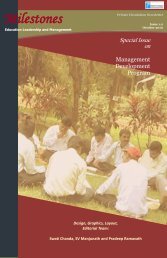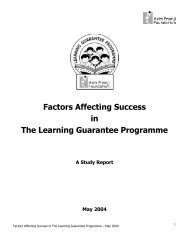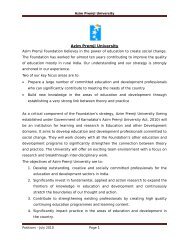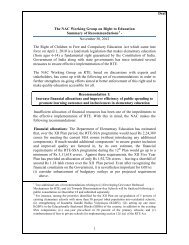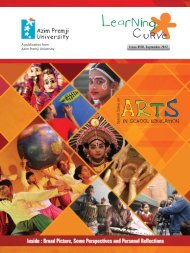Language and Language Teaching, Issue 2 - Azim Premji Foundation
Language and Language Teaching, Issue 2 - Azim Premji Foundation
Language and Language Teaching, Issue 2 - Azim Premji Foundation
Create successful ePaper yourself
Turn your PDF publications into a flip-book with our unique Google optimized e-Paper software.
Mesthrie does not sound convinced with the ideaof a continuum though. He argues that the‘caught’ <strong>and</strong> the ‘taught’ comprise the twoobvious approaches to learning a language. Rittfinds the native <strong>and</strong> non-native distinctionsignificant enough for an empirical research onthe subject. In his opinion, native intuition isdirectly correlated with the speaker’sgrammatical judgment <strong>and</strong>, Singh’s proposal maybe problematic for an empirically sustainableposition. Lele finds Singh’s position subject to acritical analysis vis-à-vis power <strong>and</strong> hegemony.Rajgopalan’s response to Singh’s position onIndian English <strong>and</strong> the question of a nativespeaker is in total contrast with that of Langue<strong>and</strong> Chaudhary. Martina Ghosh-Schellhorn onthe other h<strong>and</strong> is in agreement with Chaudharythat some of these questions must be examinedin the context of multilinguality <strong>and</strong> speechcommunity. A careful reading of the responsesuggests that Singh does not appear to leavethe contexts of multilinguality <strong>and</strong> speechcommunity out. Dickinson is uncomfortable withSingh’s claim that the speakers of Indian Englishare competent speakers of that variety.This book is a unique example of an extremelywell presented compact argument. It combinesa large variety of responses to a st<strong>and</strong> adoptedin the target paper. The last section of the bookis again uniquely innovative in the sense that itgives a summary of the questions asked fromSingh <strong>and</strong> his responses to all of them.Rajesh Kumar (PhD, Illinois) is an AssistantProfessor of Linguistics <strong>and</strong> English at the IndianInstitute of Technology Patna. He teaches graduate<strong>and</strong> undergraduate courses in Linguistics <strong>and</strong>English <strong>Language</strong>. His research <strong>and</strong> teachinginterests lie in syntactic theory, sociolinguistics,language <strong>and</strong> education, <strong>and</strong> cognitive sciences(language <strong>and</strong> human mind).thisisrajkumar@gmail.comEnglish throughFolktales: A Self-StudyBook.by Mahanad, An<strong>and</strong> &Goswami, Lalita (2011)New Delhi: Viva Books.ISBN: 978-81-309-1472-5,pp. 97Reviewed by: KamalKumar ChoudharyThis book consists of sixteen folk tales fromdifferent parts of India. It is written in very easylanguage, <strong>and</strong> some scenes of the story aredepicted through pictures, which makes itinteresting for the children. As the authors pointout, this book, intended for middle schoolchildren, is designed to improve not only thebasic skills of language (reading, writing,speaking <strong>and</strong> listening), but also teaches themthe basic grammatical structures. To meet thisgoal, each story is followed by differentexercises (notes, comprehension questions,language study <strong>and</strong> communication skills). Notesgive the word-meanings (difficult words in thetext), <strong>and</strong> also demonstrate the use of aparticular word in a sentence. Following this,there are comprehension questions based on thestory. This is followed by language study <strong>and</strong>communication skills. Thus, this book is reallygood for improving English, particularly forchildren. The stories are interesting to read, <strong>and</strong>at the same time, they also improve the languageskills of the children.Learning English in a country such as India isimportant both for children <strong>and</strong> adults. It hasbeen observed that the students who havestudied throughout in Hindi or a regionallanguage, face several problems when they joincollege or an institute, particularly if the coursesare offered in English. Even in institutes suchas IITs, remedial classes are offered to 1 st yearstudents, as some of them really face problems<strong>Language</strong> <strong>and</strong> <strong>Language</strong> <strong>Teaching</strong> Volume 1 Number 2 July 2012 49


